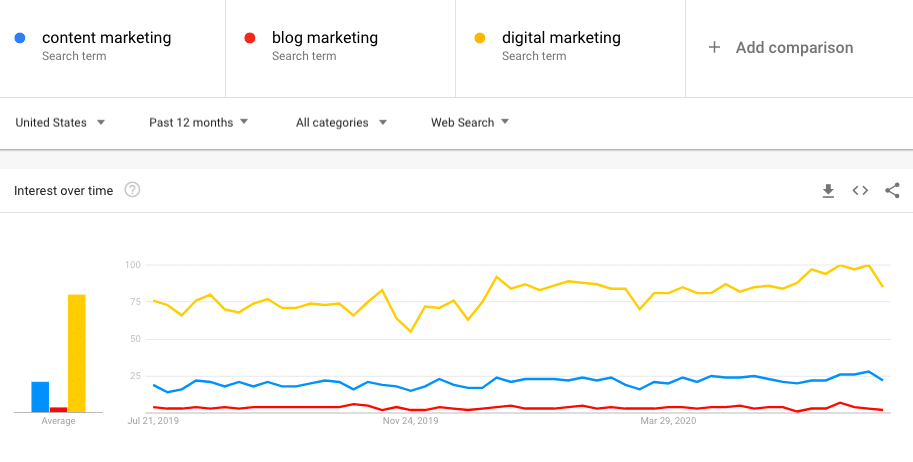6 Tips for Writing Blogs for Your Small Business Website
Nearly every business website nowadays has a blog. There are many reasons for this — from getting clicks and impressions to boosting keyword and domain authority to turning visitors into conversions. But if you’re one of the many small business website owners who’s tasked with writing blogs yourself, you may be struggling.
That’s where this blog comes in. If you combine these tips with your expert knowledge of your industry, you can easily write blogs that shoot to the top of the search results. Here are 6 tips for writing blogs for your small business website:
1. Listen to/Communicate with Your Content Manager (If You Have One)
If you’re like most small business owners, you employ a company to handle most or all of your web marketing. That web marketing company most likely has someone who plays the role of content manager for all of their clients.
Now, if blogs are being produced for a small business website, usually the web marketing company handles the entire process — from topic planning to writing/ordering to editing to search engine optimization to publishing. However, there are a handful of cases in which a small business owner may find themselves doing the blogging. Sometimes, it’s due to client preference. Other times, it’s because the client works in a highly specialized or technical industry and it’s unlikely that the agency can find a knowledgeable enough blogger to write on the subject. And in some cases, it simply comes down to the fact that the client has a small budget that the agency is focusing on other web marketing efforts, leaving nothing left over for blogging.
Whatever the case may be, it’s important that when your agency gives you a blog topic to write about, you write a blog on that topic. Or, at the very least, you consider it.
A Couple of Concessions
If you have concerns about a particular blog topic, you should voice those concerns. Not every blog topic that a content manager comes up with is perfect, nor is every agency equipped with top-tier content managers. In some cases, the person in the role of the content manager has several other roles in the agency as well and therefore doesn’t have a lot of dedicated time to come up with well-researched blog topics. In other cases, a content manager may not do good research into blog topics because they are undertrained or possibly lazy.

Of course, sometimes it’s an honest mistake that causes a content manager to give you a bad or questionable topic. For example, a content manager that is fairly new to the field of criminal defense may give a Texas attorney a topic relating to grand theft. Grand theft is a charge that exists in most states, but not in Texas. So while there may be a lot of search volume relating to the topic, it’s not relevant to a Texas attorney.
In such cases, it’s always best to communicate with the content manager. A good content manager will take note of such a thing, do as much as possible to learn about your field, and avoid making similar mistakes in the future.
Sometimes, clients will think a topic is bad and choose not to write it without ever discussing it with the content manager. In the examples above, it makes sense that the client would not want to write about the topic. But in the vast majority of cases, the content manager has good data backing up their opinion that you should have a blog on a given topic. Even if you don’t understand the point of it, if you simply take time to ask, “why?”, you may find that your content manager is knowledgeable and you agree with their assessment. Or, perhaps you still don’t understand. In that case, you can either trust your content manager and write it anyways or ask for a new topic. At the end of it all, just remember that your content manager has your best intentions at heart.
2. Find Good Blog Topics
Perhaps you don’t have a web marketing agency employed. Or perhaps you simply don’t like any of the topics that they give you. In such cases, it’s possible to find blog topics on your own.
Paid Options
The sad truth is that the best blog topics come from sources that you have to pay for. It’s usually considered a small expense for an agency that’s using it to find topics for 20 different clients, but it may be too expensive for your own use. However, if you’re really devoted to writing good blogs and you don’t mind paying for the services, here they are:
- SEMRush starts at $99.95 per month. It comes with a comprehensive keyword research tool and the amazing and innovative Topic Research tool.
- Ahrefs starts at $99 per month and also has an in-depth keyword research tool.
Both tools also have a wide range of benefits in addition to their keyword research tools. For example, they let you analyze your backlinks and do competitive analysis. If you have a contract with a web marketing agency that doesn’t include blogging, you may be able to get the agency to use these tools to get you topics. It’s not guaranteed, but it doesn’t hurt to ask. After all, your success is their success.
Free Options
There are always ways to get content ideas that don’t cost any money.
- AnswerThePublic does have paid plans, but you get a few free searches every day, which is plenty for a single small business. It doesn’t give you any search volumes, but it does give you plenty of ideas for questions you could answer with a blog.
- If you have your Google Search Console set up, you can use it to get some ideas for what people ask in relation to your business. Go to “Performance,” click “Queries,” and change the date to the last 12 months. You can then export the list and use the Find feature in excel (or Google sheets) to search for question words such as “why,” “what,” “how,” etc.
- Google Trends is another good tool to use, although you generally need to know where to start if you’re going to get anywhere.
Of course, it’s entirely possible that your best topic is already in your head. Is there a question that it seems every customer asks you? If so, then it’s a topic that a lot of people probably search online as well. Go ahead and write up your answer to that question in a blog format and there’s a good chance that it will rank.

3. Remember There’s a Gap Between What You Know and What the Reader Wants to Know
You are an expert in your field, and that’s great. You may even find your field to be incredibly fascinating — even if none of your friends or family members do. But the purpose of a blog is not to tell every fact about a subject or show off your knowledge of it or to demonstrate what’s so fascinating about it to you. The purpose of a blog is to address what the reader wants/needs to know about it.
It’s easy to get swept up explaining everything you know about a subject — especially when you know a lot and you love what you do. But you need to take a step back and figure out what is important to the reader or you will lose them. That will increase your bounce rate, hurt your blog’s ranking, and may even lead you to lose a converting lead.
So focus on the important facts — not all the facts. Avoid tangents and make sure that your answer stays focused on the question.
4. Stick to a 7th-Grade Reading Level
Everyone has a different writing style. Some people tend towards simple sentences and basic vocabulary, while others prefer to be excessively verbose. Regardless of whether it’s your writing style or you’re stuck in that mode because of your college English classes, it’s important to stray away from high-level word choices. Opt instead for vocabulary that’s at about a 7th-grade reading level, and keep your sentences mostly on the shorter side. This can be hard for some people. If you’re one of those, find a friend who can help you edit your work.
Of course, nothing is absolute, and this rule is included. If you’re a B2B company in the tech or bio industries, for example, it may be necessary to use more complex language. You may also be in an industry, such as the legal field, that requires you to use certain high-level terms in order to be accurate. If this is the case, try to define these complex terms whenever you use them.
5. Remember This Isn’t Your Personal Blog
Personal blogs rarely take off. There are many reasons for this, but one of the biggest is that people don’t really care about other people’s daily lives. Another is that it’s hard to build traffic to a blog.
Some small business owners make the mistake of using their somewhat successful business site as a launching pad for their personal blog. But writing a personal blog instead of a blog related to your industry on your website can only do you harm. For one thing, it could confuse the search engine algorithms about what the focus of your site is, thus hurting your domain authority and rankings. Also, you could frustrate readers who think they’re coming for tips about pool maintenance and end up reading a long-winded section of text about your family vacation.
Blogs have an amazing ability to get your site clicks and impressions and boost your domain authority. But if your blogs aren’t on topic, then you’re wasting this potential.
6. Include the Essentials (H2s, Intro, and Call to Action)
If you haven’t written multiple blogs before, it’s easy to forget some of the essential elements. One thing that small business owners often forget (or don’t know to include) is the subheadings (H2s). These subheadings break up the content and direct the reader through it. They also help keep you on track while writing and give you additional opportunities to incorporate keywords into the content. And, as a bonus, they can also help you with getting featured snippets if the topic is right. You may struggle with incorporating H2s at first, but after you write enough blogs, incorporating them will become natural and obvious.
Writers also sometimes launch right into the meat of the content and forget to include an intro. An intro is what helps draw the reader into the content, tells them what you’re going to be discussing, and can also help with featured snippets. If you struggle with writing intros, you can write the body of the content first and come back to write the intro at the end. This may even help you figure out what to say for the intro.
And, of course, you need a call to action. This is the most commonly forgotten element. It can be just a couple of sentences, but you need something at the end of your content that can change your visitor from simply a blog reader into a converting lead.
For example, the call to action for this blog is:
If you’ve been struggling to write ranking blogs and want to hand the reins over, contact Everyday Media Group today. We have vast experience writing and optimizing blogs so that they not only rank, but often even get featured snippets. To learn more about our content marketing services and other services in the field of web marketing, contact us today.

